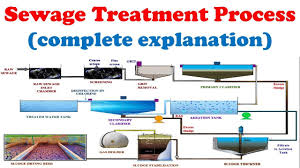Many people who are are associated with sewage treatment, wastewater treatment and waste management often use sewage and wastewater interchangeably. This is mainly due to the reason that sewage and wastewater are very similar to each other. But at the same time, it is important to stress on the fact that they are very different than each other.
Experts in the field believe that sewage is a subset of wastewater whereas one can see wastewater as the main category. It can be better understood in this way – Sewage treatment is linked with solutions where the domestic waste which includes human waste, household waste etc is acted upon and prevented from harming human health and the environment. This means that the source of waste in sewage is considered to be homes. The wastewater has many sources; domestic, industrial, agriculture, commercial etc. Yet, experts agree that there is only a thin line that separates sewage and wastewater.
In this blog, we will try to understand in-depth the similarities and differences between sewage and wastewater. We will also look at the various treatment solutions available and the need for innovative and result-oriented sewage treatment solutions in 2020.
Similarities Between Sewage And Wastewater
Polluted Water – One of the common things that can be found in both the sewage waste and wastewater is polluted water. You must have seen black water, grey water coming out of the drainage as well as in the sewage treatment plants. Water is flushed out from the toilets of the homes. Similarly, industrial plants release a large amount of wastewater into the drain. Thus polluted water is common in sewage and wastewater.
Chemicals – At home, people use a large number of products that constitute chemicals containing harmful and toxic substances. It can range from kitchen and bathroom cleaners, soaps, detergents, cosmetics, floor cleaners and whatnot. All these chemicals constitute sewage waste. There are various types of heavily laced chemicals in industrial wastewater. Moreover, the insecticides and pesticides with chemicals flow in the rainy season through drains and mix with wastewater. Therefore, chemicals is one of the common things found both in sewage as well as wastewater.
Organic Compounds
Organic compounds or organic matter is found in large quantity always both in sewage and wastewater. These biodegradable materials often make it difficult for systems to treat waste effectively. These are dangerous substances that can affect water resources and aquatic living organisms massively. Therefore biological treatment solutions are used for sewage treatment and wastewater treatment as well. There are excellent products which can be used to keep septic tanks and wastewater treatment plants running successfully.
Pathogens
No matter if it is sewage or wastewater, pathogens in the form of bacterias, viruses and parasite are always found in them. All sources of waste consist of such pathogens and they cause a large number of diseases in humans and animals. The outbreak of cholera, typhoid, dysentery in different parts of the world are caused by pathogens. Several beneficial microbes are also present which help in the degradation of organic waste and help in the treatment process.
Differences Between Sewage And Wastewater
Source – The source of sewage waste is mainly domestic. The human waste, kitchen waste, pollutants and contaminants washed off from the bathroom floor and other places seep through the sink and reach sewage. While it is true that when we think of sewage, toilet pops in the mind, but there are other wastes like food waste, fat, oil, grease that reach the sewage as well.
Wastewater constitutes waste from industrial processes. It can include heavy metals, highly toxic substances, solid waste etc. It can also contain household waste and the waste generated due to agricultural and human activities.
Treatment – Sewage waste generally can be treated in a septic tank using biological solutions. Other options like physical removal of waste from an overloaded septic tank is also possible. Sewage treatment plants are also available in communities. In wastewater treatment plants, physical, biological and chemical treatment is done on the waste to give out effluent which can be released to the environment.
Quantity – If we take sewage and wastewater separately, the quantity of wastewater generated is much more than the sewage waste. As sewage is considered a subset of wastewater, it is obvious that there is a difference in quantity.
These are some of the similarities and differences between sewage and wastewater. The amount of waste generated today is too much. The reasons range from overpopulation, increasing economic activity and industrial activity, lack of waste management awareness, lack of care and concern for the environment, no strong policies at the government level and much more. There are many treatment solutions which are at the forefront today to deal with the sewage waste as well as wastewater.
In 2020, there is an urgent need of innovative as well as cost-effective waste treatment solutions. The biological treatment of sewage and wastewater is found to be very effective and causes no harm to the environment as well. The living microbes with advanced formulation degrade the waste aggressively and helps in the treatment process. Organica Biotech is one of the leading companies in India with a wide range of effective and efficient products and solutions for better treatment of waste. The latest tools and advanced biotech technology combined with natural and eco-friendly solutions make waste management easy and hassle-free. For more details, visit www.organicabiotech.com.
